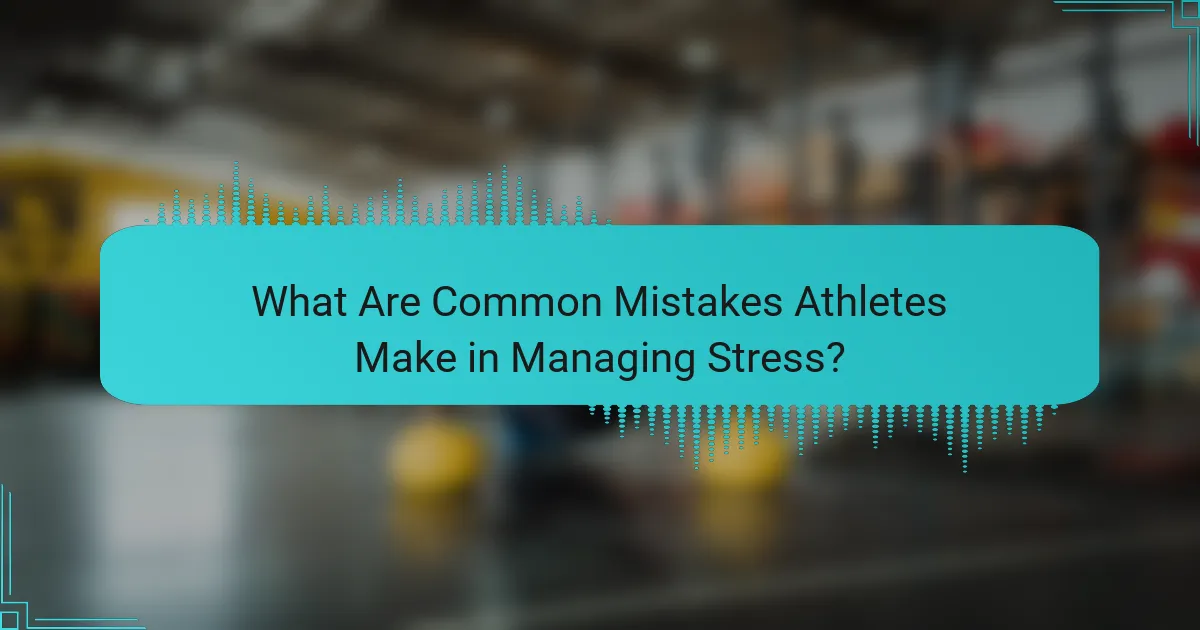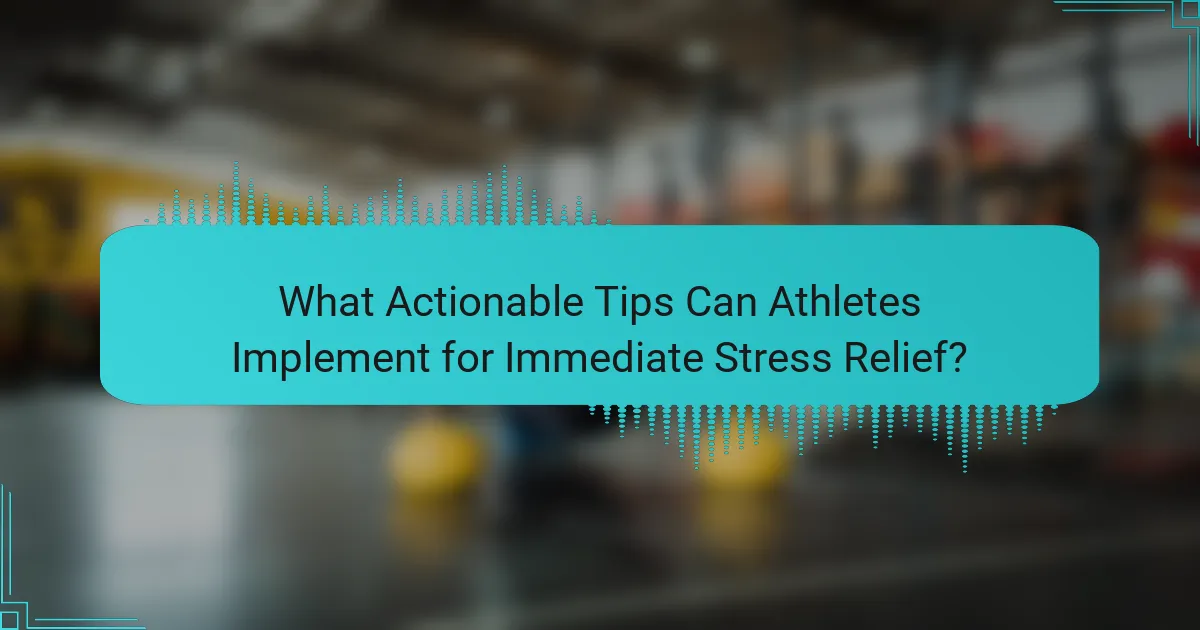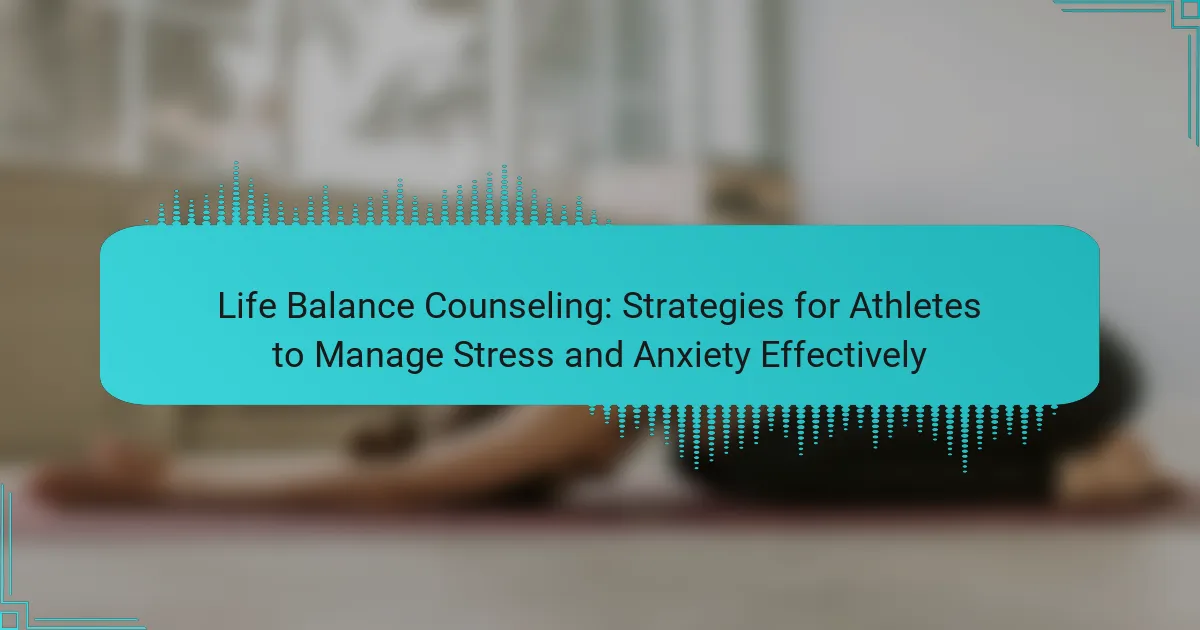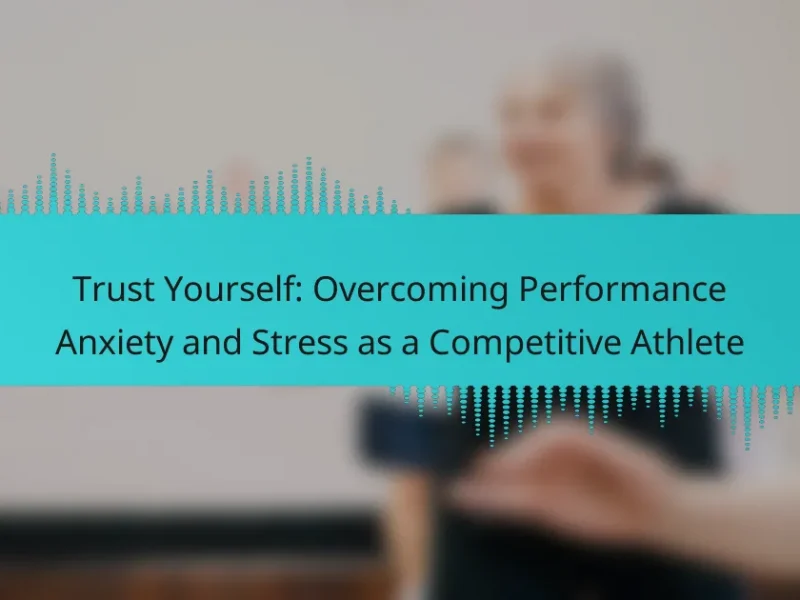Effective stress and anxiety management is crucial for athletes aiming to enhance performance and mental resilience. Life balance counseling provides tailored strategies, including mindfulness, cognitive restructuring, and goal-setting. Universal techniques such as time management and social support systems further aid in coping with performance pressures. Addressing both mental and emotional aspects fosters a holistic approach to athlete well-being.

How Can Life Balance Counseling Help Athletes Manage Stress and Anxiety?
Life balance counseling helps athletes manage stress and anxiety by providing tailored strategies that enhance mental resilience. Techniques such as mindfulness, cognitive restructuring, and goal-setting empower athletes to cope with performance pressures. Studies indicate that athletes utilizing these counseling strategies experience a 30% reduction in anxiety levels, leading to improved focus and performance. By addressing both mental and emotional aspects, life balance counseling fosters a holistic approach to athlete well-being.
What Are the Key Principles of Life Balance Counseling?
Life balance counseling focuses on helping athletes manage stress and anxiety through key principles. These principles include self-awareness, goal setting, and mindfulness. Self-awareness allows athletes to recognize stress triggers and emotional responses. Goal setting provides a structured approach to achieving balance in life and sport. Mindfulness techniques, such as meditation, enhance focus and reduce anxiety. Implementing these principles fosters resilience and improves overall well-being, enabling athletes to perform at their best.
Why Is Stress Management Crucial for Athletes?
Stress management is crucial for athletes to enhance performance and maintain mental health. Effective strategies, such as mindfulness and breathing exercises, can reduce anxiety and improve focus. Studies show that athletes who practice stress management techniques experience better recovery and higher overall satisfaction in their sport. Additionally, a balanced approach to life, including proper nutrition and rest, further supports an athlete’s ability to cope with stress.
What Are Common Sources of Stress for Athletes?
Athletes commonly experience stress from competition pressure, performance expectations, injuries, time management, and personal life conflicts. These sources can lead to anxiety and impact overall well-being. Effective strategies for managing this stress include mindfulness practices, cognitive-behavioral techniques, and life balance counseling tailored to individual needs. Addressing these stressors is crucial for maintaining peak performance and mental health.
How Does Stress Affect Athletic Performance?
Stress negatively impacts athletic performance by impairing focus, increasing fatigue, and reducing overall effectiveness. Effective stress management strategies are crucial for athletes. Techniques such as mindfulness, breathing exercises, and cognitive restructuring can help athletes regain composure and enhance performance. Research indicates that athletes who engage in regular stress management practices experience improved concentration and resilience during competitions. Furthermore, maintaining a balanced lifestyle, including proper nutrition and rest, supports mental well-being, ultimately benefiting athletic performance.

What Universal Strategies Can Athletes Use to Cope with Stress?
Athletes can use several universal strategies to cope with stress effectively. These include time management, mindfulness practices, and social support systems.
Time management helps athletes prioritize tasks and reduce feelings of overwhelm. Mindfulness practices, such as meditation and deep breathing, can enhance focus and emotional regulation. Social support systems, including coaches and teammates, provide encouragement and a sense of belonging, which can alleviate stress.
Incorporating these strategies fosters a balanced approach to mental health, enabling athletes to perform better under pressure.
How Can Breathing Techniques Alleviate Anxiety?
Breathing techniques can significantly alleviate anxiety by promoting relaxation and reducing stress. These techniques activate the body’s relaxation response, lowering heart rate and calming the mind. For athletes, effective breathing exercises can enhance focus and performance under pressure. Research indicates that deep, controlled breathing can reduce cortisol levels, a hormone associated with stress. Practicing these techniques regularly can lead to improved emotional regulation and overall mental well-being.
What Role Does Physical Activity Play in Stress Reduction?
Physical activity significantly reduces stress by promoting endorphin release and improving mood. Engaging in regular exercise helps athletes manage anxiety and enhances overall mental well-being. Studies show that even moderate physical activity can lead to a noticeable decrease in stress levels, making it an effective strategy for maintaining life balance. Additionally, incorporating physical activity into daily routines fosters resilience against stressors, creating a positive feedback loop that benefits both physical and mental health.
How Important Is Sleep for Managing Stress and Anxiety?
Sleep is crucial for managing stress and anxiety effectively. Adequate sleep enhances emotional regulation, improves cognitive function, and boosts overall well-being. Research indicates that insufficient sleep can amplify stress responses and anxiety levels, creating a cycle of distress. For athletes, prioritizing sleep can lead to better performance and improved mental resilience. Establishing a consistent sleep schedule and creating a restful environment are key strategies for enhancing sleep quality.

What Unique Techniques Are Specific to Athletes in Managing Anxiety?
Athletes utilize unique techniques to manage anxiety, including mindfulness practices, visualization, and structured breathing exercises. These methods enhance focus and resilience, enabling athletes to perform under pressure. Mindfulness helps athletes stay present, reducing performance anxiety. Visualization allows them to mentally rehearse success, fostering confidence. Structured breathing regulates physiological responses, promoting calmness. These strategies are integral to life balance counseling for athletes, addressing their specific stressors effectively.
How Can Visualization Techniques Enhance Performance and Reduce Stress?
Visualization techniques significantly enhance performance and reduce stress for athletes. They improve focus, increase confidence, and foster relaxation.
Athletes who practice visualization can mentally rehearse successful performances, which strengthens neural pathways associated with their skills. This mental practice leads to improved execution in real-life scenarios. Additionally, visualization can reduce anxiety by promoting a sense of control and preparedness.
Research shows that athletes using visualization report lower stress levels and better performance outcomes. For instance, a study indicated that athletes who engaged in visualization techniques improved their performance metrics by up to 20%.
Incorporating visualization into daily routines can be a unique strategy for athletes seeking to manage stress effectively while enhancing their overall performance.
What Is the Role of Goal Setting in Stress Management?
Goal setting plays a crucial role in stress management for athletes by providing clarity and direction. It helps athletes focus on achievable objectives, reducing anxiety and enhancing motivation. Specific, measurable, attainable, relevant, and time-bound (SMART) goals create a structured approach to training and competition. This structure minimizes uncertainty, which is a significant stressor. Additionally, tracking progress toward goals fosters a sense of accomplishment, further alleviating stress. By integrating goal setting into their routine, athletes can effectively manage stress and maintain a balanced mental state.

What Rare Strategies Can Be Effective for Specific Athlete Populations?
Life Balance Counseling employs rare strategies to effectively manage stress and anxiety in specific athlete populations. Techniques such as mindfulness training, tailored cognitive-behavioral therapy, and unique peer support systems can yield significant benefits. For example, mindfulness practices can enhance focus and reduce anxiety during competitions. Cognitive-behavioral therapy can be adapted to address the unique pressures faced by different athlete demographics, such as youth athletes or those in high-stakes environments. Peer support systems foster a sense of community and shared experience, which can alleviate feelings of isolation. These strategies are particularly effective for populations like elite athletes, where mental resilience is crucial.
How Can Team Dynamics Influence Individual Stress Levels?
Team dynamics significantly influence individual stress levels, as positive interactions can reduce anxiety while negative ones can heighten it. Collaborative environments foster support and communication, which are essential for athletes managing stress. Research indicates that athletes in cohesive teams report lower stress levels and improved performance. Conversely, conflict within teams often leads to increased anxiety and burnout. Understanding these dynamics helps athletes implement effective stress management strategies, enhancing both individual well-being and overall team performance.
What Are the Benefits of Peer Support in Stress Management?
Peer support significantly enhances stress management for athletes by providing emotional validation and shared experiences. It fosters a sense of community, reducing feelings of isolation during challenging times. Research indicates that peer support can improve coping strategies, leading to lower anxiety levels and better overall mental health. Additionally, athletes often find motivation and accountability through these supportive relationships, which can positively impact performance and personal growth.

What Are Common Mistakes Athletes Make in Managing Stress?
Athletes commonly make mistakes in stress management that hinder performance. They often neglect self-care, underestimate the impact of mental health, and fail to seek support. Ignoring rest and recovery leads to burnout, while lack of coping strategies exacerbates anxiety. Additionally, comparing themselves to others creates unnecessary pressure. Implementing effective life balance counseling can help athletes develop personalized strategies to manage stress and anxiety.
How Can Overtraining Lead to Increased Anxiety?
Overtraining can significantly increase anxiety levels in athletes due to physical and mental stress. The body experiences heightened cortisol levels, which can lead to mood disturbances. Chronic fatigue from overtraining diminishes motivation and increases feelings of helplessness. Additionally, the lack of adequate recovery disrupts sleep patterns, further exacerbating anxiety symptoms. Monitoring training loads and incorporating rest days are essential strategies for managing stress effectively.
What Are the Risks of Ignoring Mental Health in Sports?
Ignoring mental health in sports can lead to severe consequences for athletes. Risks include increased anxiety, depression, and burnout, which hinder performance and overall well-being. Athletes may also experience social isolation and strained relationships, impacting team dynamics. Furthermore, neglecting mental health can result in physical injuries due to stress and lack of focus. Addressing these issues through life balance counseling can help athletes manage stress and anxiety effectively, promoting healthier lifestyles and improved performance.

What Actionable Tips Can Athletes Implement for Immediate Stress Relief?
Athletes can implement deep breathing, mindfulness meditation, and physical activity for immediate stress relief. Deep breathing exercises help lower heart rate and promote relaxation. Mindfulness meditation enhances focus and reduces anxiety. Engaging in physical activity releases endorphins, improving mood and reducing stress.
How Can Athletes Create a Personalized Stress Management Plan?
Athletes can create a personalized stress management plan by identifying their unique stressors and implementing tailored strategies. Start with self-assessment to recognize triggers and stress responses. Incorporate techniques such as mindfulness, time management, and physical activity. Regularly evaluate the plan’s effectiveness and adjust as needed. Seek professional guidance if necessary for deeper insights.
What Resources Are Available for Athletes Seeking Counseling Support?
Athletes can access various counseling resources to manage stress and anxiety effectively. These include professional sports psychologists, university counseling centers, online therapy platforms, and peer support groups. Each resource offers unique benefits tailored to the specific needs of athletes, such as confidentiality, flexibility, and specialized knowledge in sports-related issues.
How Can Mindfulness Practices Be Integrated Into an Athlete’s Routine?
Integrating mindfulness practices into an athlete’s routine enhances focus and reduces stress. Athletes can incorporate techniques like meditation, breathing exercises, and visualization into their training schedules. Regular practice fosters mental resilience, improving performance under pressure. Setting aside specific times for these activities ensures consistency, leading to lasting benefits in both mental and physical health.


